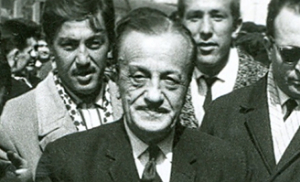The AKP and Turkey’s Long Tradition of Islamo-Fascism
By Toni Alaranta (vol. 8, no. 3 of the Turkey Analyst)
Those who claim that democracy in Turkey has been handicapped because of the repressive “Kemalist” regime overlook that the conservative right has totally dominated Turkish politics. It is the traditions of the Turkish right that need to be scrutinized in the search for the matrix of current undemocratic practices. The Turkish Islamist poet and political ideologue Necip Fazıl Kısakürek is a key figure in this context. He propagated for a totalitarian Islamist-fascist regime in Turkey, to be ruled by an Islamic version of a Führer. And today representatives of the AKP point out that understanding Kısakürek is a precondition to understand the great “cause” (“dava”) that the AKP represents.

What the Columnists Say

Several columnists have brought up the recent attack against Charlie Hebdo in Paris. Yusuf Kaplan in Yeni Safak writes that the attack was the work of the French “deep state” in order to increase Islamophobia. Orhan Kemal Cengiz in Bugün writes that pious Muslims must stop hiding behind conspiracy theories, and Nuray Mert writes on the Diken news site that blaming such attacks on groups created by the West is simply an attempt to pretend that there is not a major problem that Muslims need to tackle.
Could the MHP's Turkish-Islamic Synthesis Challenge the AKP's Hold on Power?
By M. K. Kaya and Halil M. Karaveli (vol. 2, no. 3 of the Turkey Analyst)
The upcoming local elections in Turkey will be a test of whether the ruling Justice and development party (AKP) can be successfully challenged by the opposition; indeed, of whether there is any viable opposition left to speak of. As they try to navigate in a political landscape increasingly dominated by Islamic conservatism, both the leftist Republican People’s Party (CHP) and the right-wing Nationalist Action Party, MHP, are seeking ways to reinvent themselves, hoping to appeal to a broader electorate. The efforts are beset by ideological contradictions and ambiguities, but MHP is best placed to challenge the AKP.
What Went Wrong With Turkey's Moderate Islamists?
By Halil Magnus Karaveli (vol. 1, no. 9 of the Turkey Analyst)
As the storms gather around the AKP, its rule is by all accounts likely to draw to a close. What went wrong with Turkey’s experiment of moderate Islamism? It is tempting for western observers to conclude that it was sabotaged by a supposedly autocratic, dogmatically secularist state establishment which is unwilling to surrender its positions of power. But the fatal mistake of the Islamists has precisely been to expect the seculars to accept surrender.
Where Did the Secular Republic Fail?
By Halil Magnus Karaveli (vol. 1, no. 8 of the Turkey Analyst)
The ideological confrontation between Islamism and secularism in Turkey is fed by contradictory interpretations of republican history. The enterprise of secularism is either understood as having oppressed religion or as having been insufficiently true to its Enlightenment heritage. How republican history is interpreted will ultimately shape the future course of Turkey.




